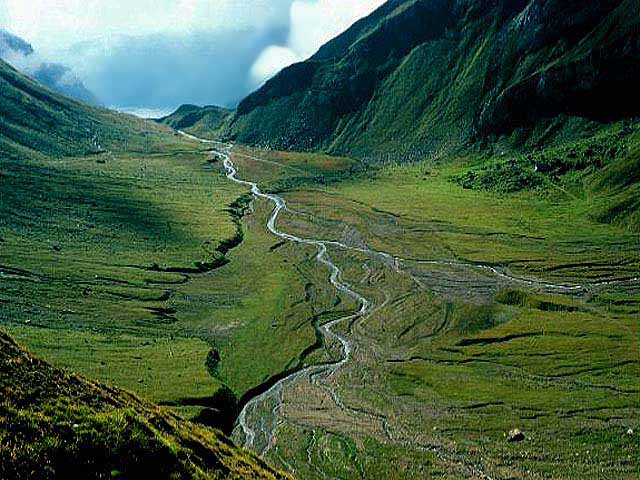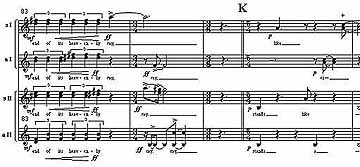
RILKE | April: The Music in Things

RILKE | April:
The Music in
Things
 |
"...inner worlds now the most practiced / of distances, as the other side of thin air: pure, immense no longer habitable." from To Music, a poem by Rainer Maria Rilke This week, an image called Braided Streams. Also: three new translations from the German.
|
The Music in Things
When we walk the wild places of the Earth, either on a hike of but an hour
or a journey of many days, the rhythm of walking, of the breath, helps one
attune to the more subtle qualities of the life of the land. Many things are likely
to escape the city dweller at first. Like the movement of natural light over the
course of an entire day, the mysterious character discovered in the hidden
depths of shadows, the momentary flash of fast flowing water, or the crossing
of a long-awaited pass with a sudden view to the South. But there is also
the newness of natural sound to be encountered, for many of the present era,
perhaps for the first time. In the mountains, each sound—of water, of falling
rocks, of a calling animal—is surrounded by a marvelous sense of open space.
In the photograph above, with early morning sunlight bringing out the rich
texture of grazed alpine grasses, what is missing here is the sound of the
braided stream below. One hears with the morning updrafts a gentle high-
pitched wavelike sound which seems to turn around itself. And as one descends,
the sound of the swiftly flowing water grows gradually louder and louder
until, as we reach the stream itself, it rises up with a roar to encompass one's
whole being.
Similarly, when we enter poetic space our relationship to the words and
language we use everyday changes instantly. A mere minute of outward
time can hold an eternity in its weave and interplay of timbres,
carrying us away into new, unknown worlds.
Sound. Music. The music in things—In the new translations of Rilke poems
I've brought together here, we encounter three distinctly different voices
which are both highly musical in presentation, but also refer to sonic imagery
as well as, in the last poem, music itself: in Anxiousness, a kind of neutral
narrative voice reflecting upon the significance of a single event, the calling
of a bird, in an autumn forest; in Lament, we hear the poet himself calling
out with great passion to the stars themselves. (In the German, Rilke makes
strikingly original ,irregular, leaps from rhyme to rhyme, the images thereby
transforming one into the other as if touched by a magic wand.); and lastly,
in the classic masterpiece, To Music, we return to the narrative voice, but
now with much more philosophical, perhaps one could say, spiritual, depth.
Let's listen:
|
Bangnis Im welken Walde ist ein Vogelruf, der sinnlos scheint in diesem welken Walde. Und dennoch ruht der runde Vogelruf in dieser Weile, die ihn schuf, breit wie ein Himmel auf dem welken Walde. Gefügig räumt sich alles in den Schrei: Das ganze Land scheint lautlos drin zu liegen, der große Wind scheint sich hineinzuschmiegen, und die Minute, welche weiter will, ist bleich und still, als ob sie Dinge wüßte, an denen jeder sterben müßte, aus ihm herausgestiegen. (c. 1903) |
Anxiousness In the faded forest sounds the call of a bird, which seems so meaningless in this faded forest. And yet the resonant call of the bird rests in this moment which brought it forth, as wide as the heavens above the faded forest. Docilely, everything empties itself into the cry: The entire countryside seems silently there, the immense wind seems nestled inside, and the minute, that wishes to move on, is ashen and quiet, as if it knew things that, in order for them to rise out of him, a man would first have to die. |
|
Klage O wie ist alles fern und lange vergangen. Ich glauben, der Stern, von welchem ich Glanz empfangen, ist seit Jahrtausenden tot. Ich glaube, im Boot, das vorüber führ, hörte ich etwas banges sagen. Im Hause hat eine Uhr geschlagen . . . In welchem Haus? . . . Ich möchte aus meinem Herzen hinaus unter den großen Himmel treten. Ich möchten beten. Und einer von allen Sternen müßte wirklich noch sein. Ich glaube, ich wüßte, welcher allein gedauert hat,— welcher wie eine weiße Stadt am Ende des Strahls in den Himmeln steht . . . (c. 1903) |
Lament O How everything is so far away and so long ago departed. I believe that the star from which I receive such glittering light has been dead for thousands of years. I believe that something frightening was said in the boat which just passed by. In a house, a clock has marked the hour . . . In which house? . . . I would like to leave my heart behind and step out under the immense sky. I would like to pray. That one of all these stars must certainly still exist. I think I know which one has endured,— which one, at the end of its heavenly ray, stands like a city of white light . . . |
| listen to a
musical composition by
Cliff Crego for Double Choirs of 24 fenale singers and
brass instruments, based on the English text of Lament; see also
Intro: Lament
for Double Choir (REQUIRES QuickTime) |
|
An die Musik Musik: Atem der Statuen. Vielleicht: Stille der Bilder. Du Sprache wo Sprachen enden. Du Zeit die senkrecht steht auf der Richtung vergehender Herzen. Gefühle zu wem? O du der Gefühle Wandlung in was?— in hörbare Landschaft. Du Fremde: Musik. Du uns entwachsener Herzraum. Innigstes unser, das, uns übersteigend, hinausdrängt,— heiliger Abschied: da uns das Innre umsteht als geübteste Ferne, als andre Seite der Luft: rein, riesig nicht mehr bewohnbar. Rainer Maria Rilke (c. 1918) |
To Music Music. The breathing of statues. Perhaps: The silence of pictures. Language where all languages end. Time standing straight up out of the direction of hearts passing on. Feeling, for whom? O the transformation of feeling into what?— into audible landscape. Music: you stranger. Passion which has outgrown us. Our inner most being, transcending, driven out of us,— holiest of departures: inner worlds now the most practiced of distances, as the other side of thin air: pure, immense no longer habitable. (all tr. Cliff Crego) |
"Dollar Store" image + backside text picture-poems.com Rilke Postcards .
Order 1 for under $1; order 100 for just $65. You might think of these as my special
student or big-city bookstore editions.Same images as the more expensive framed prints
above, but printed on tough 4" x 5 1/2 " 120 weight glossy cardstock that will last
a lifetime . . .

| view / print
Picture/Poem
Poster: Anxiousness (86 K) | or
download
as PDF |

(25) February: Images from the Periphery of Time (with recordings)
(24) February: Mountain Spring (with recordings)

|
See also another website by Cliff Crego: The Poetry of Rainer Maria Rilke |
a presentation of 80 of the best poems of Rilke in both German and new English translations: biography, links, posters |
|
See also: new |
|
"Straight
roads, Slow rivers, Deep clay." |
A collection of contemporary Dutch poetry in English translation, with commentary and photographs by Cliff Crego |